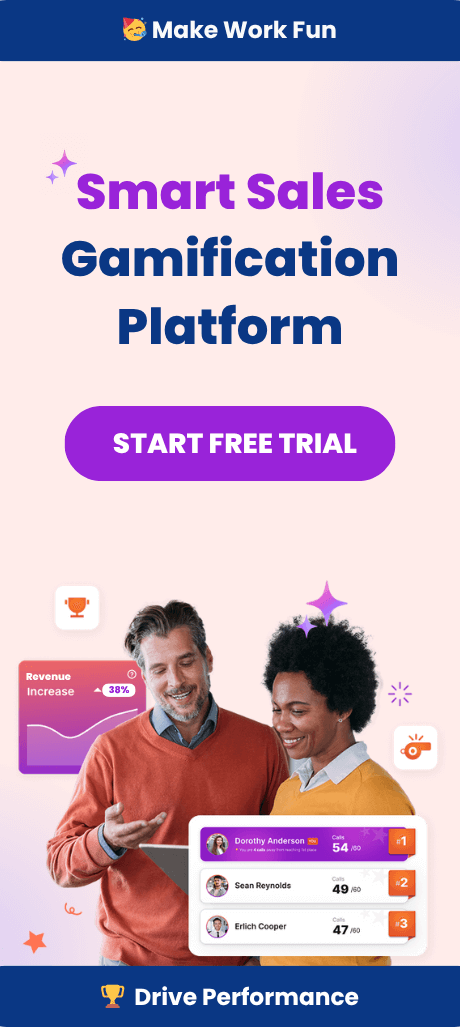Sales teams thrive on energy, motivation, and engagement. However, keeping sales reps consistently engaged can be a challenge. Studies show that only 24% of sales professionals are highly engaged at work, meaning the majority of sales teams may not be reaching their full potential.
An engaged sales team is more productive, driven, and successful. They are more likely to meet targets, close deals, and stay with your company longer. To ensure your team remains motivated, you need the right engagement tools.
Collaboration between sales and marketing teams is crucial for effective sales enablement. Both teams share resources and insights to enhance lead qualification and conversion processes, ultimately impacting the overall sales strategy and performance of the business.
In this guide, we’ll explore essential engagement tools every sales team needs to thrive—from gamification to coaching platforms—and how Spinify helps teams stay motivated and engaged.
What is Sales Engagement?
Definition of Sales Engagement

Sales engagement refers to the interactions between sales teams and potential customers throughout the sales process. It encompasses various strategies, channels, and tools used to engage with prospects, build relationships, and ultimately drive revenue. Sales engagement involves a range of activities, including email outreach, phone calls, social media interactions, and in-person meetings. By leveraging these touchpoints, sales teams can create meaningful connections with prospects, guiding them through the sales funnel and increasing the likelihood of conversion.
Importance of Sales Engagement for Sales Reps
Effective sales engagement is crucial for sales reps to succeed in today’s competitive market. By engaging with prospects in a personalized and timely manner, sales reps can build trust, establish credibility, and increase the chances of closing deals. A good sales engagement strategy enables sales reps to understand their customers’ needs, preferences, and pain points, allowing them to tailor their approach and provide value-added solutions. This personalized engagement not only enhances the customer experience but also positions the sales rep as a trusted advisor, ultimately driving higher sales performance and customer satisfaction.
Moreover, sales engagement empowers sales reps to leverage multiple platforms and communication tools to reach their target audience effectively. By utilizing social media, email marketing tools, and other sales tools, sales reps can create a seamless and engaging buyer’s journey. This strategic approach not only aids in converting leads into qualified prospects but also helps nurture long-term relationships with potential buyers.
Furthermore, tracking and analyzing customer interactions through sales engagement platforms allows sales reps to gather actionable insights. These insights are instrumental in refining sales strategies, optimizing the sales process, and ensuring that sales activities align with business goals. By continuously measuring results and adapting to customer feedback, sales reps can enhance their performance, close more deals, and drive revenue growth.
In essence, a successful sales engagement strategy is integral to the overall sales and marketing efforts of an organization. It not only boosts sales performance but also fosters a culture of frequent communication, collaboration, and innovation among sales teams. As sales reps become more adept at engaging with potential customers, they contribute to the broader success of the sales organization, ultimately achieving business value and meeting strategic objectives.
Why Sales Engagement Matters More Than Ever
The Impact of Engagement on Sales Performance
Engagement isn’t just about making work enjoyable; it directly affects performance and revenue. Engaged sales teams are:
✔ 21% more productivethan disengaged teams ✔ More likely to exceed quotas and sales targets ✔ 87% less likely to leavetheir company compared to disengaged employees
Tracking and analyzing sales calls is crucial for improving training and performance, as it helps identify key behaviors and engagement metrics that influence sales success.
When engagement drops, productivity declines, motivation dwindles, and turnover increases. That’s why investing in the right tools is essential.
Furthermore, a highly engaged sales team can significantly enhance the overall sales process by fostering a positive work environment that encourages collaboration and innovation. Engaged sales reps are more likely to share insights and strategies with their peers, leading to a more cohesive and effective sales team. This collaborative spirit not only boosts individual performance but also contributes to the success of the entire sales organization.
Engagement tools, such as gamification platforms, CRM systems, and analytics software, play a vital role in maintaining high levels of engagement among sales teams. These tools provide sales reps with the resources they need to stay motivated, focused, and aligned with business goals. By leveraging these tools, sales managers can create a dynamic and engaging work environment that supports continuous learning and development.
Moreover, engaged sales reps are more adept at building strong relationships with potential customers, as they are better equipped to understand and address their needs and preferences. This personalized approach not only enhances the customer experience but also increases the likelihood of converting leads into loyal customers. As a result, an engaged sales team can drive significant revenue growth and contribute to the long-term success of the organization.
In summary, the impact of engagement on sales performance cannot be overstated. By investing in the right engagement tools and fostering a culture of collaboration and innovation, sales organizations can enhance productivity, reduce turnover, and achieve their business objectives. Ultimately, a highly engaged sales team is a key driver of success in today’s competitive market.
Building a Strategic Sales Engagement Strategy
Optimize Inbound and Outbound Interactions
A strategic sales engagement strategy involves optimizing both inbound and outbound interactions with prospects. Inbound interactions refer to the initial contact made by prospects, such as filling out a form on a website or responding to a social media post. Outbound interactions, on the other hand, involve proactive outreach by sales reps, such as cold emailing or phone calls.
To optimize inbound interactions, sales teams can use marketing automation tools to personalize and streamline the lead generation process. This can include creating targeted content, setting up lead scoring systems, and automating follow-up emails. These tools ensure that prospects receive relevant information at the right time, enhancing their engagement and interest.
For outbound interactions, sales reps can use sales engagement platforms to automate and personalize their outreach efforts. This can include creating customized email templates, setting up phone call cadences, and using data analytics to track engagement metrics. By leveraging these tools, sales reps can ensure their outreach is timely, relevant, and impactful.
By optimizing both inbound and outbound interactions, sales teams can create a seamless and personalized experience for prospects, increasing the chances of conversion and driving revenue growth. A well-rounded sales engagement strategy not only enhances the efficiency of sales and marketing efforts but also ensures a consistent and engaging customer journey.
Essential Engagement Tools for Sales Teams
1. Gamification & Motivation Platforms
Why It Matters:
Sales can be repetitive, and motivation can fade. Gamification adds a layer of excitement by making sales competitive, rewarding, and fun. Sales managers can leverage these gamification platforms to optimize team productivity by monitoring key performance indicators and real-time metrics. By turning routine tasks into engaging challenges, gamification encourages sales reps to push their limits and strive for excellence. This approach not only boosts individual performance but also fosters a collaborative and dynamic team environment where everyone is eager to contribute.
What to Look For in a Gamification Platform:
✔ Real-time leaderboards to create healthy competition
✔ Performance tracking for goal setting and achievement
✔ Recognition and rewards to keep teams motivated
✔ Integration with CRM and sales software
✔ Customizable challenges that align with business goals
✔ User-friendly interface that encourages participation without added complexity

📌 How Spinify Helps:
Spinify gamifies sales by providing real-time leaderboards, sales challenges, AI-powered sales coaching, and instant recognition, helping sales reps stay engaged and motivated. With features like personalized dashboards and instant feedback, Spinify empowers sales teams to track their progress and celebrate their achievements, enhancing overall job satisfaction and retention. Furthermore, Spinify’s seamless integration with existing sales tools ensures that gamification efforts are synchronized with broader sales strategies, maximizing their impact on the sales cycle.
2. Customer Relationship Management (CRM) Software (e.g., Salesforce, HubSpot)
Why It Matters:
A CRM system is the backbone of any sales team. It organizes customer data, automates tasks, and ensures sales reps focus on selling, not administrative work. Additionally, the collaboration between sales and marketing teams in using CRM systems to share resources and insights enhances lead qualification and conversion processes. CRM software also plays a pivotal role in maintaining a comprehensive view of customer interactions, enabling sales teams to tailor their approach to meet the unique needs of each prospect. By centralizing customer data, CRMs facilitate seamless communication and collaboration among team members, ensuring that everyone is on the same page when it comes to managing customer relationships.
What to Look For in a CRM:
✔ Easy-to-use interface to avoid frustration
✔ Automation features to streamline workflows
✔ Integration with sales engagement tools
✔ Customization options to align with specific business processes
✔ Robust reporting and analytics capabilities to provide insights into customer behavior and sales trends

A well-implemented CRM ensures reps stay organized and spend more time closing deals rather than searching for information. It empowers sales teams to track customer interactions and follow up at the right time, ultimately improving the efficiency of the sales process and driving revenue growth. Furthermore, CRM systems can enhance customer satisfaction by providing a personalized experience, as sales reps have access to detailed customer histories and preferences. This level of insight allows for more meaningful engagements and fosters long-term customer loyalty.
3. Sales Performance Dashboards & Analytics (e.g., Gong, InsightSquared)
Why It Matters:
Sales leaders need data to understand performance trends, identify coaching opportunities, and track engagement. Sales managers can leverage analytics to monitor key performance indicators and coach their teams effectively, ensuring best practices are replicated across the entire sales force.
Analytics tools are vital for sales teams aiming to refine their strategies and achieve better results. They provide comprehensive insights into sales activities, customer interactions, and market trends, enabling sales leaders to make informed decisions. By analyzing data from various sources, these tools help identify patterns and predict future sales outcomes, allowing teams to adjust their approaches proactively.
What to Look For in Analytics Tools:
✔ Real-time performance insights to measure engagement
✔ Predictive analytics to forecast sales trends
✔ Integration with existing sales software

When selecting analytics tools, it’s essential to consider features that align with your sales objectives. Look for platforms offering customizable dashboards that present data in an easy-to-understand format. Additionally, tools that provide actionable insights and recommendations can empower sales reps to improve their performance continuously.
Analytics tools help turn raw data into actionable insights, so sales teams can improve their strategy and stay engaged. By leveraging these insights, sales teams can optimize their sales process, enhance customer engagement, and ultimately drive revenue growth. Furthermore, analytics can uncover hidden opportunities, enabling sales teams to capitalize on potential leads and close more deals.
4. Sales Coaching & Training Platforms (e.g., Lessonly, MindTickle)
Why It Matters:
Continuous learning is key to keeping reps engaged. When salespeople are well-trained, they feel more confident and perform better. A successful sales engagement strategy is fundamental to fostering effective communication and leveraging analytics. Sales coaching and training platforms are invaluable for nurturing the skills of sales reps, ensuring they remain competitive in a rapidly changing market. These platforms provide structured learning paths, helping sales reps understand complex sales processes and improve their selling techniques. By offering personalized training modules, these platforms cater to the specific needs and learning styles of each sales rep, enhancing their ability to connect with potential customers and close deals.
What to Look For in Sales Training Platforms:
✔ On-demand video and interactive training
✔ Role-playing exercises and simulations
✔ Progress tracking and feedback
✔ Integration with CRM and sales engagement software
✔ Customizable training content to align with business goals
Sales training should be ongoing, not just a one-time event. Platforms like Lessonly and MindTickle ensure teams stay sharp. These platforms also enable sales managers to track the progress of their teams, identifying areas for improvement and offering targeted support. By incorporating gamification elements, such as quizzes and leaderboards, sales training platforms can make learning engaging and enjoyable, encouraging sales reps to actively participate in their development. Furthermore, by integrating with CRM systems, these platforms ensure that training is directly linked to real-world sales scenarios, providing sales reps with practical, actionable insights that can be applied immediately to improve sales performance and drive revenue growth.
📌 Spinify’s AI Coaching Agent:
Spinify’s AI Coaching Agent takes sales training to the next level by offering personalized, data-driven coaching to each sales rep. Leveraging advanced machine learning algorithms, the AI Coaching Agent analyzes performance metrics and engagement data to deliver tailored feedback and recommendations. This intelligent tool helps sales reps refine their techniques, optimize their strategies, and close more deals. By integrating seamlessly with existing sales engagement platforms, Spinify’s AI Coaching Agent ensures that coaching is continuous, relevant, and impactful, ultimately boosting sales performance and team morale.
5. Communication & Collaboration Tools (e.g., Slack, Microsoft Teams)
Why It Matters:
Strong communication ensures sales teams stay aligned, informed, and engaged—especially for remote and hybrid teams. Utilizing other sales tools can further enhance communication and efficiency at various stages of the sales cycle. Effective communication tools are essential for facilitating seamless interactions among team members, enabling them to share insights, updates, and feedback in real-time. This not only keeps everyone on the same page but also fosters a culture of collaboration, where ideas can be freely exchanged, and challenges can be addressed collectively.
What to Look For in Collaboration Tools:
✔ Instant messaging and video conferencing
✔ Integration with CRM and sales tools
✔ Mobile access for on-the-go sales reps
✔ File sharing and document collaboration
✔ Task management and scheduling features

When communication flows seamlessly, engagement naturally improves. Sales teams that leverage robust communication and collaboration platforms can streamline their workflows, reduce misunderstandings, and enhance overall productivity. These tools also support the integration of various sales engagement strategies, ensuring that all team members have access to the latest customer data and insights. By providing a centralized hub for communication, these platforms help sales reps stay connected, motivated, and focused on achieving their business goals. Furthermore, they enable sales managers to monitor team performance and provide timely feedback, driving continuous improvement and fostering a sense of accountability within the team
6. Incentive & Rewards Platforms (e.g., Bonusly, Giftogram)
Why It Matters:
Sales reps thrive on recognition. A strong rewards program keeps them motivated and engaged. Sales calls play a crucial role within the broader framework of sales engagement, where tracking and analyzing these interactions can significantly enhance training and performance. Incentive and rewards platforms are essential for fostering a culture of appreciation and recognition within sales teams. By acknowledging the hard work and achievements of sales reps, these platforms not only boost morale but also encourage healthy competition and drive higher performance levels. Recognizing the efforts of sales reps through meaningful rewards reinforces positive behaviors and motivates them to consistently exceed expectations.
What to Look For in an Incentive Platform:
✔ Customizable rewards (monetary & non-monetary) that cater to diverse preferences and motivations
✔ Peer-to-peer recognition features to foster a supportive team environment where colleagues appreciate each other’s contributions
✔ Performance-based bonuses that align with specific business goals and objectives, ensuring that rewards are directly tied to measurable outcomes and achievements

📌 How Spinify Helps:
Spinify allows managers to instantly reward high performers, keeping morale high and motivation strong. With its intuitive interface and seamless integration with existing sales engagement tools, Spinify simplifies the process of recognizing and rewarding outstanding performance. By providing real-time feedback and recognition, Spinify ensures that sales reps feel valued and appreciated, enhancing their overall job satisfaction and commitment to the organization. Furthermore, Spinify’s gamified approach to incentives encourages friendly competition and collaboration among team members, driving continuous improvement and fostering a sense of camaraderie within the sales team.
7. Automation & Workflow Optimization (e.g., Outreach, SalesLoft)
Why It Matters:
Sales reps spend only 36% of their time actually selling. The rest is spent on admin tasks. Automating repetitive tasks improves engagement by letting reps focus on what they do best—closing deals. Additionally, a well-defined sales enablement strategy outlines specific actions and measurable steps for achieving sales goals. By implementing automation, sales teams can streamline their processes, reduce manual errors, and enhance overall efficiency. This not only saves time but also ensures that sales reps are equipped with the necessary tools to nurture leads effectively and move them through the sales funnel with ease.
What to Look For in Automation Tools:
✔ Email and follow-up automation to ensure timely communication with prospects, enhancing engagement and keeping potential customers interested
✔ Lead scoring and pipeline management to prioritize high-quality leads and optimize the sales process
✔ Integration with CRM and engagement platforms to provide a seamless experience and ensure all customer data is centralized and easily accessible

When automation handles the busywork, sales reps stay focused and engaged in revenue-generating activities. Automation tools can also provide valuable insights into sales performance, allowing managers to identify areas for improvement and tailor their coaching efforts accordingly. By leveraging automation, sales teams can increase their productivity, close more deals, and ultimately drive revenue growth. Furthermore, automation can help maintain consistent communication with prospects, ensuring that no opportunity is missed and that every lead is given the attention it deserves. This level of efficiency not only enhances the customer experience but also strengthens the overall sales engagement strategy, positioning the sales team for long-term success.
How Spinify Enhances Sales Engagement
Spinify is a powerful engagement tool that transforms sales performance through gamification, recognition, and motivation. Here’s how it helps:
🚀 Live Leaderboards:
Create friendly competition and excitement. By displaying real-time rankings, sales reps are encouraged to challenge themselves and their peers, driving a culture of continuous improvement. This competitive aspect not only motivates individuals but also fosters a team spirit that can lead to collaborative success.

🏆 Instant Recognition:
Celebrate wins in real-time. Recognizing achievements as they happen boosts morale and reinforces positive behaviors. This immediate feedback loop keeps sales reps motivated and eager to replicate their successes, while also creating a supportive environment where effort is acknowledged and appreciated.
📈 Performance Insights:
Track progress and set goals. With detailed analytics and reporting features, Spinify provides sales managers with the data needed to identify strengths and areas for improvement. This information is crucial for setting realistic targets and developing personalized coaching plans that align with individual and team objectives.

🔄 Seamless Integration:
Works with CRM, Slack, Microsoft Teams, and more. By integrating with existing platforms, Spinify ensures that engagement efforts are synchronized across all communication channels. This integration streamlines workflows, reduces administrative burdens, and allows sales reps to focus on what they do best—selling.
Companies that use Spinify report higher engagement, better performance, and a more motivated sales team. Sales engagement software integrates various communication channels and automates tedious tasks, enabling sales teams to engage with prospects more effectively and efficiently. By
Invest in the Right Engagement Tools for Sales Success
Sales engagement is more than just motivation—it’s about giving your team the right tools to stay focused, competitive, and productive. In today’s fast-paced business environment, equipping your sales team with the right engagement tools is crucial for maintaining a competitive edge and driving revenue growth. These tools not only enhance individual performance but also foster a culture of collaboration and continuous improvement within the team.
By investing in gamification, CRM, analytics, coaching, and automation tools, you can create a high-energy sales environment where reps consistently perform at their best. Gamification platforms inject fun and excitement into daily tasks, motivating sales reps to push their limits and exceed targets. CRM systems streamline customer data management, enabling sales reps to focus on building relationships and closing deals. Analytics tools provide valuable insights into sales activities, helping sales managers identify trends and optimize strategies. Coaching platforms offer personalized training, ensuring sales reps have the skills and knowledge to excel. Automation tools reduce administrative burdens, allowing sales reps to concentrate on revenue-generating activities.
🔥 Want to see how Spinify can boost your sales team’s engagement?
👉 Book a demo today and watch your team thrive! Experience firsthand the transformative impact of Spinify’s innovative features, including real-time leaderboards, instant recognition, and performance insights. By leveraging Spinify’s seamless integration with existing sales tools, you can enhance your sales engagement strategy and drive your team towards success. Whether you’re looking to improve team morale, increase productivity, or achieve higher sales targets, Spinify provides the solutions you need to elevate




